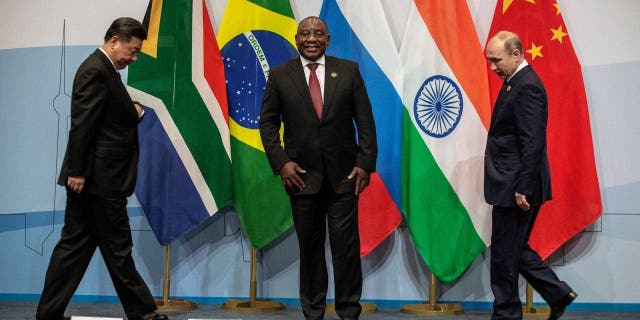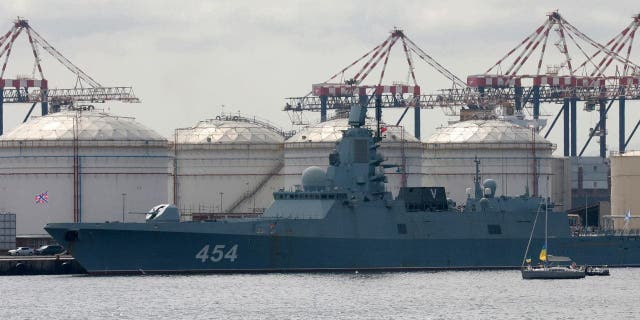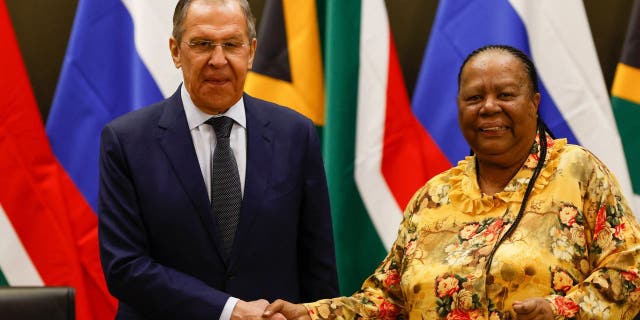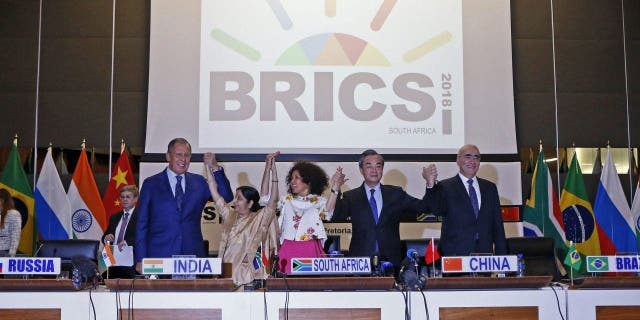South Africa launched joint naval exercises with Russia and China on Friday, prompting an international backlash along with questions about its allegiance to Western allies.
The 10-day military exercises, which are approaching the anniversary of Russia’s deadly invasion of Ukraine, mean more than an ambivalent attitude towards the war, they suggest that Washington’s attempts to woo South Africa are failing.
“There is a real desire on the part of South Africa to create a multipolar world and there is a real sense that the world has been served a disservice by a bipolar or unipolar world,” Cameron Hudson, senior associate of the Africa Program at the Center for Strategic & International Studies (CSIS) told Fox News Digital.
Hudson explained that this policy means South Africa will choose to work with whichever nation suits it best, including the United States, Russia and China, despite contradictory differences, a geopolitical tactic that Western nations have a hard time accepting.
“In a multipolar world, all partners are good partners,” he said.

Chinese President Xi Jinping, South African President Cyril Ramaphosa and Russian President Vladimir Putin arrive to pose for a group photo during the 10th BRICS conference, July 2018. (Photo by GIANLUIGI GUERCIA/PISCINA/AFP via Getty Images)
US-AFRICA LEADERS’ SUMMIT: WASHINGTON ‘PLAYS RECOVERY’ WITH RUSSIA AND CHINA
The war in Ukraine has prompted Western countries to draw geopolitical lines and they have called on nations around the world to condemn the war.
But South Africa, which was one of 35 nations to abstain from a United Nations vote last year condemning the war in Ukraine, has decided to take a neutral stance.
Secretary of State Antony Blinken held a phone call with his South African counterpart earlier this week in which they would discuss the upcoming anniversary and Minister Naledi Pandor’s support for a peaceful resolution to the war, according to a readout of the talks.
But the reading did not include any mention of joint exercises with China or Russia, two of the United States’ biggest adversaries and which vie for greater influence on the African continent as their ties with the West grow increasingly strained.
In a statement to Fox News Digital, a State Department spokesman said on Friday that the department noted with “concern” South Africa’s decision to hold joint exercises with Russia and China.
“We encourage South Africa to cooperate militarily with other democracies that share our mutual commitment to human rights and the rule of law,” the spokesman added.

The Russian frigate Admiral Gorshkov docked in the port of Cape Town in South Africa, Tuesday, February 14, 2023, en route to the South African east coast to conduct naval exercises with the South African and Chinese navies. The exercise began on Friday, February 17, 2023, a demonstration of the countries’ close ties between Russia’s war in Ukraine and China’s strained relations with the West. (AP Photo/Nardus Engelbrecht) ((AP Photo/Nardus Engelbrecht))
But Hudson argued that private or public pressure from Washington to discourage ties with its major adversaries could only further complicate the situation.
“South Africa is not unique in its position among Africans,” Hudson said. “They don’t want to be trapped between major powers. They want to be able to choose and define their external relationships and not be under pressure.”
China has for years embroiled itself across the continent by employing various loan schemes that often result in Beijing gaining more influence as poor nations struggle to pay off loan commitments – a scheme that has been dubbed “money trap diplomacy”. debt”.
But Russia’s growing interest in the African continent worries Western officials.

Russian Foreign Minister Sergei Lavrov (left) shakes hands with South African Minister for International Relations and Cooperation Naledi Pandor (right) during a news conference following their meeting at the OR Tambo building in Pretoria on 23 January 2023 .
BLINKEN FLIES TO “SUPERPOWER” BATTLEFIELD IN AFRICA
Russian Foreign Minister Sergei Lavrov has already visited the continent twice this year alone, including to South Africa in January.
He said earlier this month that the West had failed to seal off Moscow from Africa after its second tour.
Blinken traveled to South Africa in August, where he advocated ending apartheid and met with Pandora for a joint press conference.
But Blinken’s reception by the South African government did not appear to be as warmly received as Lavrov’s visit earlier this month. During a joint press conference, the internationals minister accused the United States and its Western allies of employing “common sense [of] condescending bullying” when it came to the war in Ukraine.
“It’s a bit ironic that as South Africa rails against the West, for its kind of historic hegemony, it’s aligning itself with malicious actors,” Hudson said, adding that the exercises that began on Friday are just the latest of all the courtship that the Biden administration has made in South Africa”.
Over the past 20 years, the United States has provided more than $7 billion in AIDS aid to South Africa alone, which doesn’t include the additional millions of dollars in humanitarian aid that Washington continues to provide each year.
It’s unclear how much aid Russia or China provides to South Africa annually, but Hudson explained that this is at the heart of Washington’s woes in Africa.
“We in the United States view our relationship in South Africa and with Africa as a kind of aid dependency, it’s not a relationship of equals,” he said. “It’s a donor-recipient relationship.
“While Russia and China are building equal relations,” he added. “They’re not sending aid to these countries. They’re doing business, they’re making security deals, they’re making investments, they’re building political alliances in ways that we in the United States just aren’t.”
Russia’s close ties with South Africa date back to the days of apartheid, when Moscow backed the African National Congress (ANC) in its fight against the oppressive government.

BRICS foreign ministers are meeting in preparation for the full summit of heads of state between 25 and 27 July 2018. (STRINGER/AFP via Getty Images)
CLICK HERE TO GET THE FOX NEWS APP
US support for the South African government during the early days of apartheid in the late 1940s was largely due to government support for anti-Communist ideals, a topic of immense importance to Washington at the onset of the Cold War between the U.S. and Russia.
Although the United States also eventually sanctioned the South African government in support of ending apartheid in 1986, Russia’s official and unofficial financial support to the ANC would follow for decades after apartheid ended.
Russia has also made efforts to renew its diplomatic ties with South Africa in the face of Western isolation.
“South Africa will have its cake and eat it too,” Hudson explained. “They will take humanitarian aid from us. They will take investment from the Chinese. They will take energy deals from the Russians.
“For them there is no internal inconsistency because they want a multilateral world,” he added. “The question is, is Washington willing to accept it?
“And I think the bottom line is that if Washington isn’t willing to accept that, it will be cut off from South Africa,” Hudson said.
The South African embassy in Washington, DC did not respond to Fox News Digital’s request for comment.
